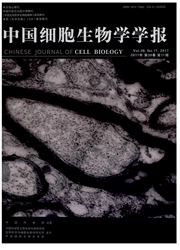

 中文摘要:
中文摘要:
拟通过RNA干扰技术特异下调人血红素加氧酶-1(human heme oxygenase-1,hHO-1)基因的表达,减少hHO-1的产量从而降低胆红素的产生,探讨在胆红素产生前就阻断其产生,为临床早期防治新生儿高胆红素血症及胆红素中毒性脑病探索一种新的有效手段。针对hHO-1基因设计并化学合成三对小分子干扰RNA(small interfering RNA,siRNA)。采用脂质体转染法将siRNA转染入人肝脏细胞株HL-7702;荧光显微镜检测siRNA转染细胞的效率;转染siRNA1-2天后经RT—PCR和Western印迹方法检测hHO-1表达水平和蛋白质量;并采用HO-1诱导剂血红素诱导或hHO—1表达质粒转染细胞以上调hHO—1表达,检测siRNA干扰后hHO-1产量和酶活性。结果显示:设计的三对siRNA能不同程度的特异下调hHO-1表达,筛选获得抑制效果最佳的siRNA-3。siRNA-3抑制hHO—1呈现浓度与时间依赖性。与非特异对照siRNA及未处理组比较,血红素诱导和hHO-1表达质粒转染均能上调HL-7702细胞内hHO-1表达,提高hHO-1产量,但转染siRNA-3后hHO-1表达明显抑制,同时hHO-1活性随着基因表达下调而下降。实验表明设计合成的siRNA-3抑制效果明显。siRNA-3通过降解hHO—1,减少hHO-1产量,降低酶活性,最终减少胆红素产生,从而使RNA干扰技术成为降低新生儿高胆红素血症和胆红素中毒性脑病发生的一种候选方法。
 英文摘要:
英文摘要:
Neonatal hyperbilirubinemia is a common clinical condition mainly caused by the increased production and decreased excretion of bilirubin. Current treatment is aimed at reducing serum level of bilirubin. Heme oxygenase (HO) is a rate-limiting enzyme which generates bilirubin. In this study, we intended to specifically suppress HO- 1 using RNA interference technique. Small interfering RNA (siRNA)- 1, -2 and -3 were designed based on human HO-1 (hHO-1) mRNA sequences, siRNA was transfected into a human hepatic cell line (HL-7702). hHO- 1 transcription and protein levels were then determined. In addition, the inhibitory effect of siRNA on hHO-1 was assessed in the cells treated with heroin or transfected with hHO-1 plasmid, siRNA-3 showed the most potent suppressive effect on hHO-1. This inhibition is dose- and time- dependent. Compared with control, both hemin and hHO-1 plasmid up-regulated HO-1 expression in HL-7702 cells. However, the up-regulation was significantly attenuated by siRNA-3. Furthermore, the decrease of hHO- 1 activity was coincident with the suppression of its transcription. Finally, siRNA-3 was shown to reduce hHO-1 enzymatic activity and bilirubin level. Thus, this study provides a novel therapeutic rationale via blocking bilirubin formation for preventing and treating neonatal hyperbilirubinemia as well as bilirubin encephalopathy at an early clinical stage.
 同期刊论文项目
同期刊论文项目
 同项目期刊论文
同项目期刊论文
 期刊信息
期刊信息
